The Interview, Explanation Line by Line, Meaning of Difficult Words, English CBSE Class 12 NCERT Flamingo Chapter 7
THE INTERVIEW
(Explanation and Meaning of difficult words)
Author – Christopher Silvester
Part I
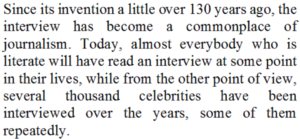

| Word | Meaning |
| A little over | Slightly in excess of |
| Commonplace | Happening very often, Usual |
| Journalism | Profession of writing for newspapers / magazines or preparing news for broadcasting |
| Celebrities | Famous people, Well known people |
| Over the years | During many years |
The process of interview was developed slightly more than 130 years ago. Now-a-days interview is a very commonly occurring activity. Almost everybody who can read, must have read an interview sometime during their life. (Many people must have watched an interview on television. Some people might have listened to an interview on radio or on mobile phone.) Yet another aspect of interview is that thousands of famous people have given interviews. Some of the famous people have been interviewed many times in their life.


| Word | Meaning |
| Hardly | Not at all |
| Function | Purpose |
| Merits | Rights and wrongs, Worth, Importance, |
| Considerably | To a great extent |
| Extravagant | Excessive, Elaborate, More than required |
Therefore it not a surprise that people have different opinion about the purpose, method and importance of an interview. The variation in opinion is quite large. Some people make an excessive claim that interview is the highest form of finding the truth. They also claim that the practice of taking interviewing is an art. (Implying that it is not a simple straight forward task.)
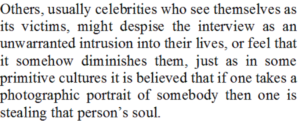

| Word | Meaning |
| Victims | Those who suffer, Those who do not get fair treatment |
| Despise | Hate, Criticize |
| Unwarranted | Not justified, Unnecessary, Unreasonable |
| Intrusion | Interference, Uninvited |
| Diminish | Reduce their value or dignity |
| Primitive | Very old, Less developed, Very basic |
| Steal | The act of making a theft, Rob |
Other people to express opinion about interview are those who give interviews. These people are usually famous people. They feel that they do not get a fair treatment during interviews. They hate or criticize the process of interview because they feel that it is not justified to interfere or talk about their personal life. They feel that interview usually reduces their dignity. They equate this to the belief of very old times when taking photograph of a person was considered as good as taking out the soul from the person. Implying that some celebrities feel that their personal life is exposed during interview and their true feelings or thoughts become known to all.


| Word | Meaning |
| Wounded | Hurt, Injured, Disrespected |
| Lose a part of themselves | Against nature of somebody |
V. S. Naipaul is a famous writer. He is of the opinion that some people feel hurt or injured during interview. He further says that sometimes questions during interview are against the nature of the person or completely unrelated to the person who is giving interview. In such situation the person giving the interview does not know how to respond and the answers could be against his / her true belief.
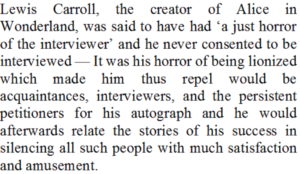

| Word | Meaning |
| Creator | Author |
| Horror of the interviewer | Afraid of the person who takes interview |
| Consented | Agreed, Gave permission |
| Lionize someone | Giving importance, treating like a celebrity |
| Repel | To stay away from, Avoid |
| Acquaintances | Known people but not friends |
| Persistent | Repeated, Never ending |
| Petitioner | Those who make a request |
| Amusement | Delight, Fun, Happiness, |
Lewis Carroll is author of the novel Alice in Wonderland. In this novel he had created the character of Alice. Several films have been made based on this novel. Lewis Carroll never agreed to give an interview because he was afraid of any person taking his interview. He was afraid of receiving lot of importance. So he preferred to remain away from people who could later say that they knew him or that they had once interviewed him. Though people used to repeatedly request Lewis Carroll for autograph but he avoided giving autograph. He was quite satisfied in avoiding interviewers and autograph seekers. He would later happily narrate the stories of being successful in such efforts.


| Word | Meaning |
| Condemnatory | Strong disapproval, Strong criticism, Strong dislike |
| Wrecked | Spoilt, Destroyed, Disturbed |
Rudyard Kipling was a famous author. He disapproved and disliked interviewers more than Lewis Carroll disliked them. Caroline was wife of Rudyard Kipling. On 14 October 1892, she and her husband Rudyard Kipling were at the town of Boston. In her diary she had written that on that day their day was spoilt by two reporters.
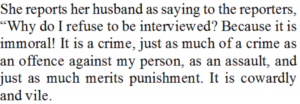

| Word | Meaning |
| Immoral | Unethical, Wrong, |
| Assault | Attack |
| Offence | Wrong doing, A behaviour to upset someone |
| Merits | Requires |
| Vile | Bad, Wicked, Unacceptable |
Caroline wrote in her diary that her husband Rudyard Kipling had explained to the reporters why he used to refuse giving interviews. Her husband had told reporters that taking interview was not an ethical activity. He considered it as a crime, an upsetting behaviour against his personality, a personal attack on him. Hence he thought that a person who wants to take interview should be punished. Rudyard Kipling thought that this was activity of coward and wicked people.


| Word | Meaning |
| Perpetrated | Carry out or perform an immoral activity |
Rudyard Kipling used to say that a sensible person would never take interview of another person. And a sensible person is much less likely to give an interview. In spite of such belief, some years ago, Rudyard Kipling had taken interview of Mark Twain. If we consider the opinion of Rudyard Kipling, it was an ‘assault’ on Mark Twain.


| Word | Meaning |
| Ordeal | Unpleasant or painful or difficult experience |
| Interviewee | One who give interview |
H. G. Wells was a very famous writer. H. G. Wells used to give interview quite frequently. In 1894 he was giving an interview. In that interview he had said that taking an interview was a very difficult activity. But 40 years after making this statement while giving this interview, he had taken interview of Joseph Stalin.
Joseph Stalin was a political leader of Soviet Union.
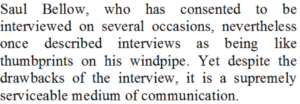

| Word | Meaning |
| Consented | Agreed, Gave permission |
| Several | Many |
| Nevertheless | In spite of, However |
| Being like thumbprints on his windpipe | Feeling uneasy or puzzled |
| Despite | In spite of |
| Drawbacks | Shortcomings, Weaknesses |
| Supremely | Extremely |
| Serviceable | Acceptable, Frequently used |
| Medium | Method, Means |
Saul Bellow was a famous author. On many occasions he had given his permission to give interview. It implies that he had given many interviews. In spite of that he mentioned that he was always puzzled and had difficulty while giving interview. In spite of these shortcomings of interview, it is the most frequently used method of communication.


| Word | Meaning |
| These days | Nowadays, Presently, During this era |
| Vivid | Clear |
| Impression | Understanding |
| Contemporaries | People of the present era, People of the same era |
Denis Brian is an author and a journalist. He has written that nowadays we can get good and clear understanding about people of our era by interviewing them. Such clarity could not be obtained in earlier times because during those days interviews were not so common.


| Word | Meaning |
| Everything of moment | Everything that is important or interesting |
| Unprecedented | Never happened before,
Happening for the first time |
| Influence | Effect, Capacity to make an impact |
Through an interview we can know about almost everything that is important or interesting to us. The interviewer needs to ask questions related to such topics. Therefore the interviewer is in a powerful situation that was not available to him during earlier times. The interviewer thus has acquired an ability to affect the person being interviewed and make an impact on the audiences.
Part II


Umberto Eco had taught at various universities during his life time. He was also a famous writer. He has written quite extensively.
He said above line to emphasize that he considered teaching as his main profession. And he used to write whenever he got time to do so.


| Word | Meaning |
| Extract | Part of something |
| Interviewer | Person who takes interview |
In the following lines some part of the interview of Umberto Eco is provided. The interview was taken by Mukund Padmanabhan. Mukund used to work for an Indian newspaper The Hindu.
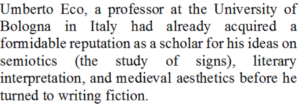

| Word | Meaning |
| Acquired | Obtained, Achieved |
| Formidable | Strong, Impressive, Awesome |
| Scholar | Highly educated, Having great knowledge about something |
| Semiotics | Study of signs and their meanings |
| Literary | Related to literature |
| Interpretation | Explanation, Meaning |
| Medieval | About middle age of history, Pertaining to old era |
| Aesthetics | Aspects of looking pleasant and of good artistic choice |
| Turned to | Became |
| Fiction | Literature, stories or novels that are not based on reality |
At the time of interview Umberto Eco was working as professor in University of Bologna, Italy. He had achieved an impressive reputation of being highly educated and having great knowledge about study of signs and their meanings. He was regarded as person with extensive knowledge about explanation of various signs when used in literature. He was respected for his knowledge about good artistic choices prevailing during middle ages of history. During later part of his life he devoted more time to writing. He usually wrote fictional literature.
[The period between 500 AD and 1500AD is usually regarded as medieval period.]


| Word | Meaning |
| Academic texts | Writings or literature taught in an educational institute |
| Staggeringly | Surprisingly, Greatly, Unbelievably great |
| Wide-ranging | Large variety, Various |
Umberto Eco wrote fictional books, texts to be taught in educational institutes, essays, children’s books, articles for newspapers and many more. His writings are surprisingly very large in number and of great variety.


| Meaning | |
| Equivalent | Almost equal to |
| Intellectual | A person who enjoys careful thinking and studying, Wise |
| Superstardom | Very famous and respectable, Status of being a superstar, |
In 1980 a new novel written by Umberto Eco was published. The title of the novel was The Name of the Rose. More than 10 million copies of this novel have been sold. With such success of his novel, people started regarding him as a wise person. He became very popular and achieved the status of a superstar.


| Word | Meaning |
| Novelist | Person who writes novels |
| Academic | A person who works in the field of formal education |
Mukund reminds Umberto Eco what another novelist and academician David Lodge had once said about Umberto Eco. David Lodge had expressed that he was not able to understand how Umberto Eco was able to write so much, how Umberto Eco could do so much of work and achieve so much.


| Word | Meaning |
| Give the impression | Give a hint, Make some person to form an opinion |
| In the end | Finally after everything has been considered |
| Convinced | Became certain, Firm in one’s belief, Completely sure |
Umberto Eco replied that because of his works people might have formed opinion that he had done many things. After due consideration about my work I believe that I have been doing the same work again and again.


Mukund asks Umberto Eco what work he has been doing again and again.
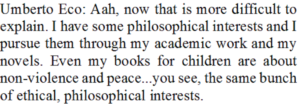

| Word | Meaning |
| Pursue | Continue to do, To engage, To follow |
| Ethical | Moral |
Umberto Eco expressed that it was difficult for him to explain about works he had been carrying out. I have interest in certain type of philosophy of life. I continue to follow these thoughts through my novels and my work for educational institutes. Books that I write for children are based on the principles of non-violence and peace. Hence through these writings also I am following the same moral principle, same belief, same thoughts and same interest.


| Word | Meaning |
| Eliminate | Remove completely, Destroy |
| Universe | World |
Umberto Eco continues to speak.
He says that he wants to tell about a secret. He asks what would happen if every empty space in the world is removed and every space in every atom is removed. Umberto Eco explains that in such situation the whole world could be held in his fist. Implying that the world exists because each one of us allow others the space to have one’s own thoughts and the opportunity to create one’s own life.


| Word | Meaning |
| Interstices | A small gap |
| Elevator | An equipment for movement to different floors, Lift |
Umberto Eco continues to speak.
He says that in the same manner, we have lot of empty spaces in our lives. These are very small gaps. For example, let us imagine that you are coming to my house. You have reached the building of my apartment. Now you are travelling in the lift to reach the floor on which my flat is situated. And I am waiting in my flat for your arrival.


Umberto Eco continues to speak.
This is one example of small gaps in our lives. We are waiting for something to happen. I write about such empty spaces in our lives. I have already written an article while I was waiting for you to complete your travel from first floor to the third floor. Then he laughs.


| Word | Meaning |
| Scholarly | Full of wisdom |
| Playful | Joyous, Light hearted |
Mukund says that certainly every person cannot do that. [Writing an article in a short duration which is the time taken to travel from first floor to the third floor]. Mukund further tells that even non-fictional and other articles of wisdom written by Umberto Eco give a feeling of joy to readers. These articles also reflect the personal qualities of Umberto Eco.


| Word | Meaning |
| Marked | Clearly noticeable, Significant |
| Departure | Change, Shift, Variation |
| Invariably | Always, Every time |
| Depersonalized | Not attaching human feelings and emotions |
| Dry | Not interesting, Not engaging |
| Consciously | Knowingly, Intentionally |
| Adopted | Developed, Selected, Preferred |
| Approach | Style |
Mukund continues to speak. Mukund says that it is noticeable and significant change from the style that is usually adopted for educational purposes. The usual academic style always does not include the human feelings and human touch. These usually do not engage the reader and are quite boring. Did you intentionally develop and select this informal style of writing. Or is it your natural style of writing.
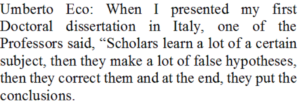

| Word | Meaning |
| Doctoral dissertation | Thesis of Ph.D. |
| Scholars | Students |
| Hypothesis | Assumptions |
Umberto Eco narrated an incident when he had submitted his thesis for his first Ph. D. This incident had happened in Italy. His professor had told Umberto Eco that many student would study a particular subject deeply. Then they make lot of false assumptions. Then they examine these assumptions and correct these. And at the end of their thesis they write their conclusion.


| Word | Meaning |
| On the contrary | Opposite to something |
| Recognised | Accepted, Understood |
| Dissertation | Thesis |
The professor further told that Umberto Eco had narrated the complete story of his research. Umberto Eco had also included his trials and his errors in his thesis. This method of writing a thesis was opposite to what most of the students were following.
Umberto Eco further told Mukund that, simultaneous to above remarks, his teacher accepted that Umberto Eco was correct. So the professor published the work of Umberto Eco as a book. This was an indication that the professor liked the work of Umberto Eco.


Umberto Eco told that when above incident occurred, his age was 22. At that age itself he became aware that students should write their thesis on the same patterns that he had written. They should tell the complete story of the research and write the thesis as if narrating a story.


| Word | Meaning |
| Narrative | Descriptive, Describing something |
| More or less | Almost, Nearly |
Umberto Eco continues to speak.
Umberto Eco tells that because of this awareness and understanding, his all essays are of descriptive nature. And probably this is the reason that I started writing novels very late. I was almost 50 when I started writing novels.


| Word | Meaning |
| Frustrated | Disappointed, Unhappy, Annoyed |
| Essayist | A person who writes essays |
| Novelist | A person who writes novels |
| One day or another | Some day in future |
Umberto Eco continues to speak.
Umberto Eco says that Roland Barthes is his good friend. Roland Barthes was disappointed and unhappy because he was an essayist and not a novelist. He wanted to become a creative writer sometime in the future. But he could not do so. He died before he could become such a writer.


Umberto Eco continues to speak.
Umberto Eco says that he never had such kind of disappointment in his life. I had started writing per chance or unintentionally. Umberto Eco had never thought of doing something in future. He started doing it right away. He liked to describe things or situations. So writing novel was probably most suitable to him.
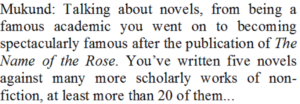

| Word | Meaning |
| Went on to become | Changed the profession , Became famous later |
| Spectacularly | Impressively, Fantastically, Greatly |
Mukund says that when we talk about novels something comes to my mind. Earlier you were famous as an academician. [A person who is devoted to teaching and writing for educational purpose.] Later you became a great famous novelist after your novel The Name of the Rose was published. You have written five novels while your other great non-fictional works are more than 20.
![]()
![]()
Umberto Eco interrupts Mukund and says that his non-fictional works are more than 40.


| Word | Meaning |
| Seminal work | Work that helps more development, Innovative, Important |
| Semiotics | Study of signs and their meanings |
Mukund expresses surprise to know that non-fictional works are more than 40. Some of the works in these are innovative and influential in the field of study of signs. These helped further development in this field. But if we ask people about Umberto Eco, they would say that he is a novelist. Mukund asks Umberto Eco if such opinion of people bothers him.
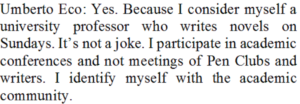

| Word | Meaning |
| Pen Clubs | Group of writers |
| It is not a joke | It is not an easy work to do |
| Identify myself | I consider myself |
Umberto Eco replies by saying yes, which means such opinion does worry him. He considers himself a professor who teaches at a university and writes novels in his free time. He further emphasizes that being an academician is not an easy work. I attend several conferences related to aspects of education. I do not attend meetings of any group of writers. I consider myself a part of the community that is devoted to education.


| Word | Meaning |
| Shrugs | Moves shoulders to indicate “It does not bother me” |
| Stuff | In this paragraph it implies articles or other literature |
| Semiotics | Study of signs and their meanings |
Umberto Eco continues to speak.
Umberto Eco says that he is not worried if most of the people read his novels only but do not read his other works. He laughs and moves his shoulders to imply that it does not bother him. I am aware that if I write novels more people read it. I do not expect a large number of people, say one million, would read my articles on semiotics.
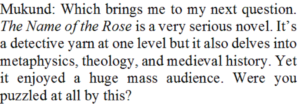

| Word | Meaning |
| Detective yarn | A part of it is detective |
| Delves | Talks about, Explores |
| Metaphysics | Branch of science that studies nature of reality |
| Theology | Study of religious beliefs |
| Medieval | About middle ages of history, Pertaining to old era |
| Puzzled | Not able to understand, Confused |
Mukund says that now he wants to ask the next question. The Name of the Rose is a very serious novel. Some parts of this novel can be considered a detective novel. But this novel also talks about reality, religious beliefs and middle age history. In spite of these, the novel has become very popular. Many people have read this novel. Did you ever get confused by it?


Umberto Eco replies that he was not confused. He says that journalists get confused. Sometimes publishers also get confused. The reason of their confusion is their belief that people like to read something which is not relevant or not important. They also believe that people do not want to read a novel that describe a difficult experience.
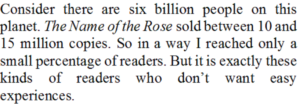

Umberto Eco continues to speak.
Umberto Eco says that let us imagine that about six billion people live on earth. Approximately 10 to 15 million copies of The Name of Rose have been sold. Therefore we can say that only a small percentage of people have been attracted to read this novel. But these are the readers who do not want to read something which talks about simple aspects.


Umberto Eco continues to speak.
Umberto Eco does not want that people should always read only that literature which does not narrate simple things. [Implying that people should read some light reads also.] He says that after having his dinner at 9 PM, he watches television. He likes to watch two television serials namely ‘Miami Vice’ or ‘Emergency Room’. He enjoys these serials and he needs the enjoyment of watching these serials. But he does not want to watch these during the entire day.


Mukund wants to know if the reason of the great success of the novel is because it is written in the background of middle age of the history.


Umberto Eco interrupts Mukund and says that it could be possible. But he wants to tell one more aspect. He says that he writes story the way a wise person from China would write. [He wants to tell that his writings have a good story telling characteristic and includes wisdom of ancient times.]


| Word | Meaning |
| Cathedral | A very large church |
Umberto Eco continues to speak.
He says that his publisher from America liked his book very much. But she thought that not more than 3000 people would buy my book. She thought so because not many people in America had seen cathedrals or knew Latin language.


Umberto Eco continues to speak.
Therefore the publisher gave Umberto Eco advance for 3000 copies only. But finally about two to three million copies of novel were sold in America.


Umberto Eco continues to speak.
Umberto Eco says that many books / novels have been written about middle age of history. Many of these books were written and published before my novel was published. I am of the opinion that it is difficult to understand why a book becomes successful or popular. Nobody can predict about success of any book.


Umberto Eco continues to speak.
Umberto Eco says that if he had written The Name of the Rose ten years earlier or ten years after it was actually written, the contents of book would not have been same. Nor the book would have been as popular. It is difficult to understand why this book became so popular or successful.
****

0 Comments